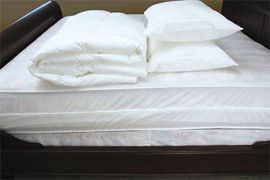Benefits of Immunotherapy
Injection Desensitisation in Allergy
Only two specific treatments are available to the allergic patient – allergen avoidance and allergen-specific immunotherapy (SIT). Medication although useful, will only suppress symptoms but do little to modify the long-term disease process. When one considers the expense of long term allergy medication, immunotherapy must be viewed as a cost-effective treatment option.
Who will benefit from allergen immunotherapy?
The ideal candidate is an allergic person who is unable to avoid the offending allergen in daily life and in whom drug therapy has failed to control the allergy or in whom drug side-effects have become intolerable. Most allergy sufferers in Canada will benefit from this excellent treatment.
Who should not receive immunotherapy?
The procedure is generally not used in those under 5 years of age or patients with coronary heart disease. The patient should also not be wheezing at the commencement of therapy. Immunotherapy should also be avoided for those who are; pregnant, have chronic uncontrolled asthma, and food allergy. It has been shown that immunotherapy may modify the natural history of asthma and may even prevent asthma in allergen sensitized children.
How is allergy skin testing performed?
The intention is to introduce a very small volume of extract of a potential allergen into the epidermis. In addition, a positive control of histamine and a negative control of saline must be done. If the patient is allergic, he/she will notice itching within about two minute, followed by erythema (flare), and then a wheal, which expands progressionally between five and 20 minutes after testing.
What is the procedure for allergy shots?
The injections should be given in the presence of a doctor. If there has been a problem since the last visit, the next dose may need to be modified or omitted. The injection of allergen extract is given into the outer portion of the upper arm once a week.
The injection dose is doubled weekly until a state of tolerance to the allergen is achieved, usually at 15 weeks. Thereafter maintenance injections are given at about 4 weekly intervals for a period of 3 years to complete the immune process. The patient should be observed for about one half hour after each injection to ensure an adverse reaction does not occur. All forms of sport, exercise, alcohol and hot baths should be avoided for 6 – 8 hours afterwards as the increased blood circulation could precipitate an anaphylactic reaction.
What affects test results?
Numerous factors influence allergy skin results, so it’s essential to follow proper techniques. Individuals will react to different degrees even when all other conditions are controlled.
Allergen solution used: This is one of the most important components as the amount and quality of allergen present will determine the result. Whenever possible, use standardized solutions, which ensure that the manufacturer has provided a reliable amount of allergen.
Individual sensitivity: Allergy testing shouldn’t be performed on skin with eczema or in patients with obvious determinographism as they have a heightened level of reactivity and a high potential for false positives.
Patient’s age: Skin allergy testing by prick or intradermal method can be done at any age, but reaction is less pronounced in smaller children and the elderly. It’s a myth that infants don’t show positive skin tests and only react with a flare.
Gender/ hormonal effects: There’s a significant increase in wheal and flare reaction in menstrual mid-cycle, corresponding to ovulation, peak estrogen and low progesterone levels.
Medication: Asthma and allergy medications can significantly interfere with allergy skin testing. Antihistamines suppress the early allergic response- exactly what the test is looking for. With longer-acting antihistamines, a period of a month or so might be required to be fully free of the effect.
What is the outcome & benefits of successful immunotherapy?
The success of immunotherapy is dependent on the patient receiving regular injections of the highest tolerated dose for at least 3 years. Successful immunotherapy will reduce the severity of an allergic disorder, improve the quality of life and diminish the risk and cost of long term prescription and over the counter medication.
How do I check coverage?
Most patients with private health insurance are covered through their drug plans. You should check the DIN coverage on the plan. If you are not covered by the specific DIN, most patients have a waiver in their health plans that cover Injectable Allergy Vaccine/ Immunotherapy as prescribed by a physician. Patients under Ontario Provincial Programs, such as Welfare, Disability, Ontario Drug Benefits, as well as patients over the age of 65 years are covered through the Ministry of Health and Long-Term Care.
What is an Allergist?
An allergist/immunologist is a physician specially trained to manage and treat allergies and asthma. Becoming an allergist/immunologist requires completion of at least nine years of training. After completing medical school and graduating with a medical degree, a physician will then undergo three years of training in internal medicine (to become an internist) or pediatrics (to become a pediatrician).
Learn More About
Benefits of Immunotherapy
How to Prevent Dust Mite Allergies
Pillow Encasings Covers for Allergies
You might think dust mites take up only a little room in your bed. In fact, within 10 years, dead dust mites and their waste can double the weight of your mattress.



